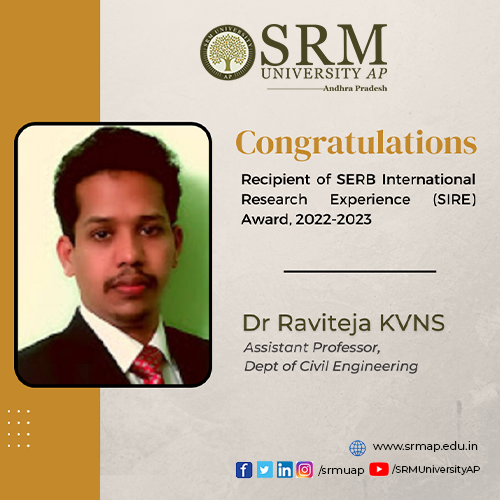
SERB International Research Experience (SIRE) is a coveted opportunity for passionate researchers to collaborate with leading institutions across the globe for high-end research training in frontier areas of Science and Technology. Dr Raviteja from the Department of Civil Engineering has earned this opportunity through his resourceful project titled “Sustainable Ash based Geosynthetic Clay Liners for MSW Landfills”. The work proposes a sustainable design of solid waste landfill liners using industrial by-products like fly ash.
Municipal solid waste (MSW) landfills need to be lined at the bottom to avoid contaminant transport. The conveyance of noxious pollutants from the landfill to the natural ground can be restricted using natural or synthetic barriers. In general, natural materials like clays/bentonites in combination with geomembranes (GMB) are used in liners. However, to increase the strength properties and reduce the compressibility characteristics, bentonites are often mixed with sand. With the increased cost and scarcity of sand, there is a renewed interest among the researchers to identify an alternative material to replace sand proportion in compacted GCLs in MSW landfills. Among several materials, fly ash is proved to be a potential substitute for sand in landfill liners.
This experience will serve as an excellent opportunity to work at one of the world-renowned, state-of-the-art geoenvironmental laboratories at the University of Illinois Chicago. “I feel fortunate to collaborate with Prof. Krishna Reddy, one of the eminent researchers in the geoenvironmental research fraternity. My research at UIC would be on developing sustainable ash-based geosynthetic clay liners for MSW landfills. I also wish to pursue recent advances in this area and identify a framework for my future research”, said Dr Raviteja. The project will help him establish strong research collaborations with experts in the geotechnical labs at other US universities. He can also make field visits to identify the practical problems and direct his research toward the real-field applicability.
With an enriching research exposure at UIC, he will be able to formulate innovative and advanced research problems to enhance the visibility and applicability of his project. Presenting this work at various conferences and seminars will also attract various potential collaborations and MoU with other universities abroad. According to him, “this is a less explored domain that will immensely benefit research scholars and undergraduate students to invent new possibilities and scopes in the future”.


Congratulations professor. Keep achieving a lot. Many more to come in your way. Cheers